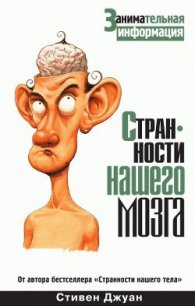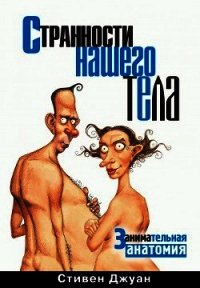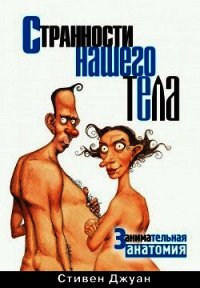Могут ли поцелуи продлить жизнь? - Джуан Стивен (читать книги бесплатно .TXT) 📗
Drs Mika Koivisto and Antti Revonsuo are from the Centre for Cognitive Neuroscience at the University of Turku in Finland.
140
M. Koivisto and A. Revonsuo, ‘The role of unattended distracters in sustained inattentional blindness’, Psychological Research,2008, vol. 72, no. 1, pp. 39–48, Epub 5 July 2006.
141
S.Juan, ‘When is seeing not seeing?’, The Register, 19 January 2006.
142
Dr Kenton McWilliams is from the School of Optometry at the University of Missouri in St Louis.
143
Personal communication, 18 May 2006.
144
R. Williams and W. Madil, ‘Goggle eyed’, New Scientist,17 June 2000, p. 65.
145
Dr Anna Gislen is from Lund University in Sweden.
146
A. Gislen and L. Gislen, ‘On the optical theory of underwater vision in humans’, Journal of the Optical Society of America A: Optics, Image Science, and Vision,2004, vol. 21, no. 11, pp. 2061–2064.
147
A. Gislen, E. Warrant, M. Dacke and R. Kroeger, ‘Visual training improves underwater vision in children’, Vision,2006, vol. 46, no. 20, pp. 3443–3450.
148
J. Travis, ‘The eyes have it’, Science News,17 May 2003, p. 308.
149
E. Aserinsky and N. Kleitman, ‘Regularly occurring periods of eye motility, and concomitant phenomena, during sleep’, Science,1953, vol. 118 (3062), pp. 273–274.
150
Dr David Maurice is from Columbia University.
151
D. Maurice, ‘The Von Sallmann lecture 1996: An ophthalmological explanation of REM sleep’, Experimental Eye Research,1996, vol. 66, no. 2, pp. 139–145.
152
Drs F. Hoff mann and G. Curio are from the Free University of Berlin.
153
F. Hoff mann and G. Curio, ‘REM sleep and recurrent corneal erosion – hypothesis’, Klinische Monatsblatterfur Augenheilkunde,2003, vol. 220, nos. 1–2, pp. 51–53.
154
‘Rolling eyes gather more oxygen’, New Scientist,28 February 1998, p. 23.
155
A. Mijolla, international Dictionary of Psychoanalysis,eNotes, Seattle, 26 May 2006.
156
G. Cook, ‘How do we take advantage of infl ection points?’, Cook & Company Commentary,Winter 2003, p. 2.
157
S. Juan, ‘What’s this “scotomisation” in The Da VinciCode?’, The Register,9 June 2006.
158
S. Juan, ‘Why seeing is not always believing’, National Post,28 September 2006, pp. 1–2.
159
S. Juan, ‘Great moments in human research’, The Register,27 January 2007.
160
S. Juan, ‘Great moments in human research’, The Register,3 February 2007.
161
University of California, San Diego Medical Centre, Types of Nasal Dysfunction,University of California, San Diego, 12 August 2006.
162
S. Juan, Are there people with no sense of smell?’, The Register,16 September 2006.
163
S. Juan, ‘Is there an evolutionary advantage in snoring?’, The Register,14 July 2006.
164
S. Juan, ‘What evolutionary advantage is there in making a sound while snoring?’, National Post, 30 October 2006, pp. 1—2
165
Drs J. A. Gottfried and R.J. Dolan are from the Functional Imaging Laboratory of the Wellcome Department of Imaging Neuroscience in London.
166
J. Gottfried and R. Dolan, ‘The nose smells what the eye sees: Crossmodal visual facilitation of human olfactory perception’, Neuron,2003, vol. 39, no. 2, pp. 375–386.
167
Drs R.A. Osterbauer, P. Matthews, M. Jenkinson, C. Beckmann, P. Hansen and G. Calvert, are from the Oxford Centre for Functional Magnetic Resonance Imaging of the Brain at Oxford University.
168
R. Osterbauer et al., ‘Colour of scents: Chromatic stimuli modulate odour responses in the human brain’, Journal of Neurophysiology,2005, vol. 93, no. 6, pp. 3434–3441.
169
Drs S. Lombion-Pouthier, P. Vandel, S. Nezelof, E. Haffen and J. Millot are from the Laboratoire de Neurosciences at the Universite de Franche-Comte in Cedex, France.
170
S. Lombion-Pouthier et al., ‘Odor perception in patients with mood disorders’, Journal of Aff ective Disorders,2006, vol. 90, nos. 2–3, pp. 187–191.
171
Drs K. Sugiyama, Y. Hasegawa, N. Sugiyama, M. Suzuki, N. Watanabe and S. Murakami are from the Nagoya City University Medical School.
172
K. Sugiyama et al., Smoking-induced olfactory dysfunction in chronic sinusitis and assessment of brief University of Pennsylvania Smell Identifi cation Test and T&T methods’, American Journal of Rhinology,2006, vol. 20, no. 5, pp. 439–444.
173
S.Juan, ‘Who knows what there is to know about the nose?’, The Register,17 November 2006.
174
Dr Betty Repacholi is from the Department of Psychology at the University of Washington in Seattle.
175
T. Case, B. Repacholi and R. Stevenson, ‘My baby doesn’t smell as bad as yours: The plasticity of disgust’, Evolution and Human Behaviour, 2006, vol. 27, no. 5, pp. 357–365.
176
Drs V. Curtis, R. Aunger and T. Rabie are from the London School of Hygiene and Tropical Medicine.
177
V. Curtis et al., ‘Evidence that disgust evolved to protect from risk of disease’, Proceedings/Biological Sciences. The Royal Society,2004, vol. 271, suppl. 4, pp. S131— 133.
178
V. Iannelli, Do Babies Have Sinuses?Your Guide to Pediatrics, About Inc., New York, 4 July 2006.
179
S. Juan, ‘Why do babies always seem to have a runny nose?’, The Register,28 July 2006.




